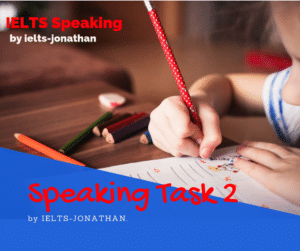Did you know that the second part of the IELTS Speaking test can be the most difficult for candidates, even Native Speakers.
But don’t despair it can also be the easiest part, and the most enjoyable.
There is a valid reason for this part of the IELTS test, and I will explain this below.
One reason for Part 2 is to allow the candidate speak at length and meet the fluency criteria.
A second reason is to allow the examiner to grade your ability for the follow up questions in Part 3.
They are trained to listen carefully for language range, grammar accuracy and pronunciation is normal speech.
They can then chose the best question sets in Part 3 that allows you to display your real language ability. So it’s important to fill that 2 minutes the best you can.
Part 2 Structure
You are given a set of prompts and a question.
The prompts are not particularly challenging, but follow a pattern to give you ‘ideas’ and ‘structure’ for your 2 minute talk.
This gives the examiner ‘a further opinion‘ to your level, ready for Part 3.
One way to do well in this section is to try and relax.
A relaxed candidate always performs better and responds well.
If you don’t understand something, always ask the examiner to repeat the prompt question.
The examiner can’t help you directly, but repetition might help you understand the prompt better.
Other tips are
- Don’t give the examiner an opportunity to ask ‘can you say anything else about that’.
- Speak for the full 2 minutes until the examiner stops you.
- Don’t hesitate too much, you are allowed to make some mistakes, it’s natural.
- Connect your sentences and use the structure given in the prompt.
- Attempt to use complex sentences rather than short, simply ones.
and
- Don’t be afraid to correct yourself.
What if you really don’t understand the prompt or even worse the prompt doesn’t apply to you?
If you’re preparing for IELTS, and feel you cannot answer some of the speaking questions properly, simply because they really do not apply to your current life experience, then don’t worry as you’re not alone.
For example:
Q. Talk about an object you own that is especially valuable or important to you.
Problem: I have a quite spartan lifestyle and I don’t have any emotional attachment to any objects I own.
Q. Talk about an object that has had great influence in your life, and explain how it influenced your life.
Problem: While I could talk for hours about books that I love, I don’t really feel that there is a book that has truly influenced my life.
IELTS Speaking Topic: A Subject you took at school
Describe a subject you took in high or secondary school.
You should say:
what the subject was
how the teacher taught this subject
how long you studied this subject
and explain why you didn’t like it.
My maths teacher always tended to be quite demanding with us as students and it seemed he often made quite simple theories over complicated, at least to me. I sometimes didn’t understand what my teacher had said, and so I often struggled with the homework. I was also a chatty student and probably didn’t listen as much as I should have done.
This often left me feeling frustrated. I felt that maths was the most challenging subject in the world and I nearly gave up.
Another reason was that there were too many abstract formulas I had to remember. I know that I am not that good at memorising things, so I often used the wrong formula in the practice exams, and made lots of mistakes which got low marks as a result.
Maths was such an important subject that I decided to focus hard and it was suggested I have some extra tuition. The tuition was a completely different experience and I gained a lot from it, so much so, that I didn’t do too badly in the final test. I’m pleased that I focused on this subject at that time, as although I didn’t enjoy it, it is a practical skill that I have used every day.
Solution to this problem
IELTS is a test of your language ability, not intelligence or knowledge.
You may think the IELTS test is an interrogation, but you don’t really need to answer with the truth.
However, I would feel more comfortable with the be honest approach, even if it does not directly answer the question.
You would probably be able to answer more naturally, and therefore be more fluent.
Which one do you think is a better strategy?
You can use tips and information on this website to help make it easier to obtain a higher score, but remember you still need to work at learning the language to be successful.
Please share to someone you know and in the meantime take a look at my Facebook Page and Website for IELTS answers and you can also join my Facebook Group here too.
Good Luck
Jonathan
I’m Jonathan
I’ve taught IELTS and University English in more than a dozen universities and schools around the world.
I’m a parent, traveller and passionate about language teaching and helping students achieve their dreams.
Whilst living in Austria or working in Asia, I run IELTS courses to help students get to where they want to be.
If you are serious about IELTS, connect with me to see how I can help you.



